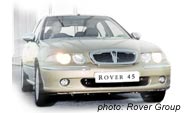LONDON (CNNfn) - German luxury car maker BMW may unload its troubled U.K. subsidiary Rover Cars, and could decide on the fate of the business at a meeting of the company's supervisory board Thursday.
BMW said it would release a statement Thursday and will hold a news conference on Friday, although it declined to say what topics it planned to discuss. Speculation is mounting that the company will use the occasion to announce big changes at Rover, which the German media has dubbed "The English Patient" in a swipe at the unit's history of troubles over recent years.
Shares of BMW (FBMW) rose 9.1 percent to 30 euros Wednesday, after the company acknowledged Tuesday that it had not ruled out a disposal of Rover Cars among the options it is considering. As well as Rover autos, the U.K. arm makes the popular Land Rover range of utility vehicles and Mini subcompact cars.
"The board of management of BMW has been working on different scenarios to restructure Rover Group Ltd.," BMW said in a statement late Tuesday. "The company has reported regularly to the public about the current situation at Rover...The decision preferred by the board of management will be presented during the regular supervisory board meeting Thursday...and published afterwards."
 A BMW spokesman told CNNfn.com Wednesday that halting production at Rover Cars and closing down a factory at Longbridge, central England that employs 9,000 workers was one of the "conceivable variants" under consideration. The spokesman would not comment on a report that BMW plans to retain the Land Rover and Mini units. The U.K. government has pledged 152 million pounds ($240 million) in financial support to Rover. A BMW spokesman told CNNfn.com Wednesday that halting production at Rover Cars and closing down a factory at Longbridge, central England that employs 9,000 workers was one of the "conceivable variants" under consideration. The spokesman would not comment on a report that BMW plans to retain the Land Rover and Mini units. The U.K. government has pledged 152 million pounds ($240 million) in financial support to Rover.
Earlier, Germany's Sueddeutsche Zeitung reported that BMW was poised to sell Rover along with its Longbridge plant to a buyer that is "not among the established auto groups."
The newspaper said BMW would retain the Land Rover unit - whose sport-utility vehicles are especially popular in the United States - and the venerable Mini, for which a new version is said to be in the works and could come to market in 2001.
BMW said in January that Rover's loss in 1999 was bigger than its 1998 deficit of 1.87 million German marks ($930 million).
Any decision to dump Rover Cars would mark a retreat from BMW's often reiterated commitment to Rover, which has been a thorn in the company's side since it bought the business from defense company British Aerospace - now called BAE Systems (BA-) -- in 1994 for $1.2 billion. Last year, BMW pledged to invest 10 billion German marks ($4.95 billion) in Rover over five years, adding to more than $3 billion it has already pumped into the subsidiary.
Halting Rover Cars production would also be sure to infuriate British unions and politicians who believed they secured a promise from BMW to keep faith in the subsidiary.
Government Concerned
The British government said it had contacted BMW Wednesday to signal its concern about the fate of Rover.
"The government has been in touch with the company," the U.K.'s Department of Trade and Industry said in a statement. "They have informed us that they will be considering a range of options at the supervisory board meeting tomorrow. We have stressed to them the importance of the company to the U.K."
A senior British union official urged BMW managers to "keep their nerve" on Rover.
Tony Woodley, the chief negotiator for the Transport and General Workers Union, told BBC Radio: "It's not only in the interests of Britain and British workers, I believe it's in the long-term interests of BMW." Woodley also questioned whether any party would want to buy Rover if it came without its profitable Land Rover and Mini units.
The Amalgamated Engineering and Electrical Union called on BMW to clarify its stance on Rover. "It is time to remove any shadow of a doubt about the future," General Secretary Ken Jackson was quoted as saying.
The Wall Street Journal cited an individual close to BMW as saying that the company had also considered sticking with the current turnaround plan, or taking more measures to cut costs and trim operations.
Strong pound
Hitherto, in its efforts to salvage the embattled subsidiary, BMW had decided on a full-fledged revamp of the product range, replacing the ageing Rover 200 and 400 models with newer lines.
Beyond its production woes, Rover has also suffered from the effect of a strong pound on exports. As the pound strengthens, U.K. exporters either raise the price of their goods in overseas markets, or earn ever-narrower profit margins at constant selling prices.
Restructuring at Rover led to a 5 percent drop in BMW's total output last year, with Rover sales down 25 percent. By contrast, sales of BMW-badged vehicles rose 7.4 percent, boosted by record sales of its Series 3 range, while those of its Land Rover arm surged 16 percent. 
-- from staff and wire reports
|

